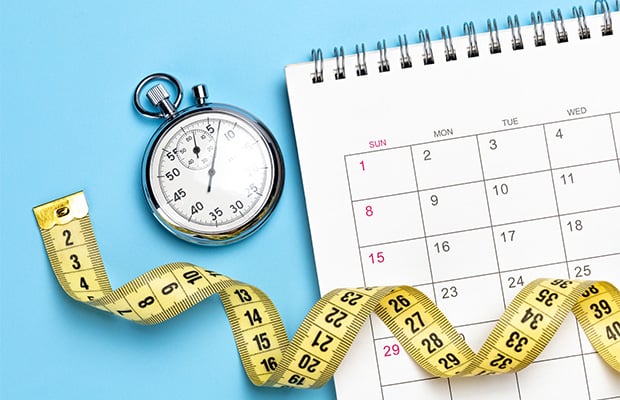Reaching and keeping to a healthy weight cuts your risk of heart and circulatory diseases. But it can be tricky to do. This article can help you understand what might be holding you back. Keep going with healthy changes to your diet and lifestyle, and even if you’re not losing weight as quickly as you like, you’ll still improve your health.
1. Expecting too much too soon
You may have gained weight over time. It can also take time to unlearn habits and lose weight. It can feel frustratingly slow when you want to lose weight quickly. But, to keep the weight from coming back you need to make changes you can stick with in the long run.
Tip
Healthy weight loss is around 0.5 to 1kg (1 to 2lb) per week. But even smaller amounts add up over time. Stick with it and if the dial is going in the right direction, however slowly, you’ll get there.
2. Only focusing on exercise
To lose weight, you need a calorie deficit. This means using up more energy than you get from eating and drinking. It's possible to do enough exercise to achieve this. However, it’s hard to keep this up.
Keep a food and activity diary to confirm that you are consistently doing what you need to
More exercise can also increase your appetite, making it harder to reach this goal. Guidelines from the National Institute for Health and Care Excellence (NICE) recommend changing your diet as well as physical activity.
Tip
Find an activity you enjoy rather than the one that uses the most energy. Then you’re more likely to stick with it. Spinning, running and aerobics classes are great if you enjoy them, but you could also try other activities like gardening, walking or dancing.
3. Restricting your diet too much
Be wary of any eating plan that does not include all the main food groups. This is a sign that it might not be giving you all the nutrients you need. An unbalanced diet can leave you feeling unsatisfied after meals, making you more likely to snack later.
Tip
Including a little bit of the foods you love as part of a balanced meal is a healthy approach. It can help you balance out your diet and not feel like you’re missing out.
4. Drinking too many calories
When changing our diet it’s easy to focus on food and forget about drinks. Across a day the sugar in drinks like soft drinks, fruit juices and in tea or coffee can easily add up to the equivalent of three extra chocolate biscuits.
Tip
Choose drinks that are sugar-free to avoid adding extra calories to your diet. Instead of drinking juice, have a piece of fruit to finish your meals. This contains less free sugars and adds more fibre to your diet, helping you to feel fuller and snack less.
Want to get fit and healthy?
Sign up to our fortnightly Heart Matters newsletter to receive healthy recipes, new activity ideas, and expert tips for managing your health. Joining is free and takes two minutes.
I’d like to sign-up
5. Feeling stressed
Stress can lead us to eat more, or change the types of foods we eat. You might find that you snack more or that you’re eating more than you normally would because you’re not as mindful at mealtimes.
Tip
If you find stress affects you this way, try to think of how you can change your habits in response to stress. Maybe you could do something with your hands, such as writing, drawing or doing a crossword, as an alternative to snacking.
6. Living differently
Our lifestyles change over time and weight loss methods that worked for you in the past may not be as helpful now. For example, you might have caring responsibilities that cut back your free time, be cooking food for more people than yourself, or cannot be as physically active as you used to be.
Tip
Instead of relying on old methods, think realistically about what changes you can make that will fit into your life now.
7. Lacking sleep
We tend to reach for foods higher in sugar and fat when we’re tired. So if you’re often tired, this can lead to weight gain. Being tired can make it harder to stick to a healthy eating plan.
Tip
Boost your chances of a good night's sleep by having a wind down routine that will help you to relax. Try dimming the lights, reading a book instead of looking at screens in bed, and avoiding caffeine in the evening.
8. Medical reasons
There can be medical reasons why you might find it hard to lose weight or have gained weight. If you have been consistent with your changes but are still struggling, talk to your GP. They can see if you need any further tests or if there could be other options to help.
Tip
Keep a food and activity diary to confirm that you are consistently doing what you need to do to lose weight. You can take this with you when you talk to your GP.
Tried this at home?
Have you followed any of the tips in this article? Or do you have a healthy tip to share? Email your thoughts and any photos for a chance to be featured in the next magazine.
What to read next...










